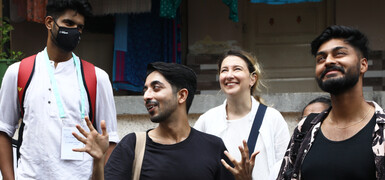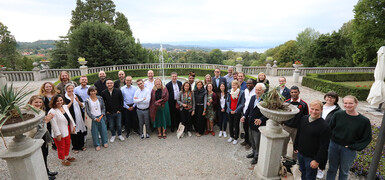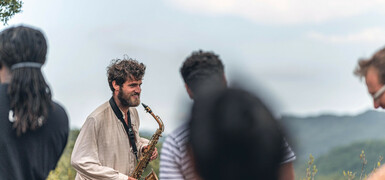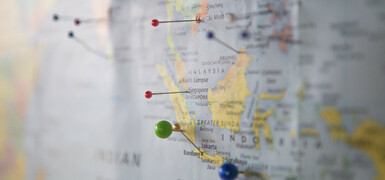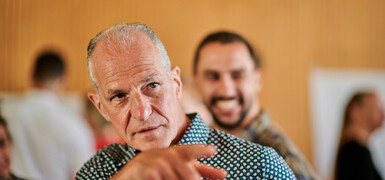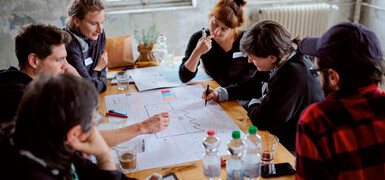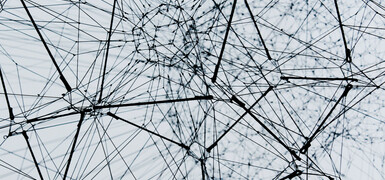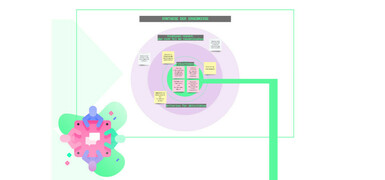
Co-Creating a Strategy for the Future of the Global Diplomacy Lab
How can we create sustainable impact with a member-driven strategy?
After two years of co-creation, the Global Diplomacy Lab (GDL) finalized a strategy to reach its overarching goal: creating Diplomacy 4.0. Members, the secretariat and the Elected Advisory Council realized early on that any strategy would only be sustainable if it drew from the creativity and experience of everybody involved. Their process showcases how sustainable impact can be created with a member-driven strategy.
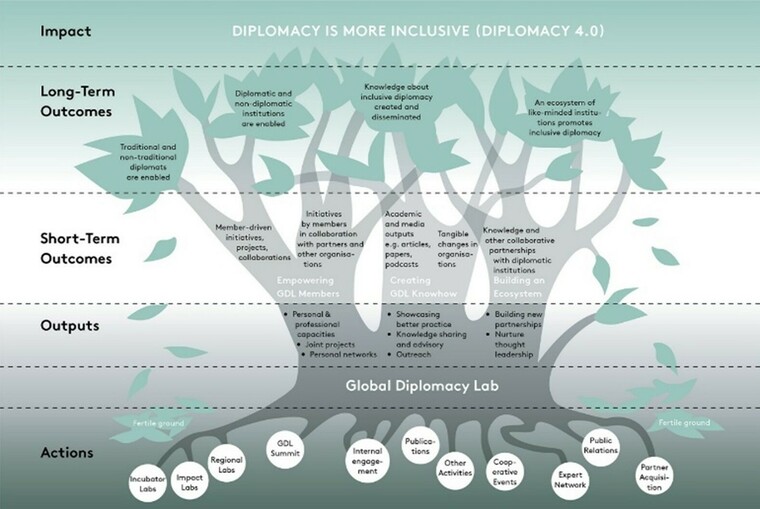
In 2019, after five years of existence, the Global Diplomacy Lab organized a meeting in Accra, Ghana, to discuss the future of the GDL. Participants identified the need for a new comprehensive strategy to align members, partners, and the secretariat, and to help guide the GDL towards its intended impact. They created a strategy group consisting of five well-established members who were charged with creating the vision for Diplomacy 4.0. This vision now lies at the heart of everything the GDL does. The GDL distinguishes four levels of diplomacy:
- Diplomacy 1.0 = government-to-government
- Diplomacy 2.0 = track two diplomacy, i.e., government-to-government plus experts from relevant fields
- Diplomacy 3.0 = people-to-people dialogues, i.e., NGO-to-NGO plus business-to-business
- Diplomacy 4.0 = multi-stakeholder, i.e., bringing all actors together in a way that ensures full participation. This is the culmination of Diplomacy 1.0 to 3.0.
More than a strategy
The strategy group quickly realized that in order to truly make an impact, a strategy alone would not be enough. The world of traditional and non-traditional diplomacy is highly complex and more input, dimensions, and outcomes would be needed. Therefore, additional working groups were created to expand on parts of the overarching strategy in several key areas, including:
- Developing the “impact tree” model, which illustrates the specific areas where the GDL and its partners intend to create impact and how concrete actions feed into the larger context.
- Developing a PR and communication strategy.
- Creating a financial sustainability strategy.
- Drafting a member charter that outlines the ideals and values shared by members, partners, and the GDL secretariat. It serves as a guide for new and established members on how the GDL works.
Every group was entrusted with the freedom to develop their own work. The secretariat supported from the background as a sparring partner and additional resource. The groups were made up of new and established members from different continents and professional fields, each contributing her or his own strengths and perspectives. This exchange of experience was just as important for the process as it was for the results, provoking positive, creative tensions as well as constant opportunities for mutual learning. The diversity of the groups also mirrored that of the GDL itself and ensured a high sense of member-ownership in the results.
Since the very beginning, the Federal Foreign Office has accompanied the Global Diplomacy Lab as a partner on every step of its journey. The initial consolidation was largely driven by members and very rewarding to observe. Questions such as “Who are we? What are we striving towards? How can we have more impact?“ stem from deep within the community. I’m very impressed with the members, as they don’t rest on past achievements and instead re-evaluate these questions at regular intervals. As a result of their continuous reflection, the GDL creates even more meaningful outcomes as well as impact, and I am glad to be part of this ongoing journey.
Putting strategy into action
After a feedback round with the rest of the GDL, the working groups responsible for implementation enlisted the help of more members – thus further boosting engagement – and looked for synergies to jointly design activities and solutions between strategic areas. Finally in January 2022, a meeting was held in Bad Belzig, Germany, to discuss the implementation of the various working groups’ outcomes. Over the course of three days, participants developed an action plan to maximize the GDL’s impact in alignment with the impact tree.
The action plan covers a variety of measures ranging from small tasks, like standardizing post-Lab impact reports, to large ones, such as the creation of task forces to further advance the GDL’s impact. The attendees of the workshop in Bad Belzig agreed that the members should continue to be responsible for the implementation of the plan.
As a result, two task forces were created to lead the way forward:
- The task force for impact is responsible for ensuring that the GDL stays on track and achieves the impact outlined in the impact tree.
- The second task force is charged with assisting the secretariat to reach financial sustainability goals and to support members with fundraising.
Because the systemization of the GDL’s impact is still in its infancy, the attendees of the workshop in Bad Belzig decided to hold an evaluation of the task forces after a pilot phase of six months. Although the GDL cannot foresee the challenges and obstacles ahead, they have developed a strong foundation built on the principles of co-creation and mutual support.
The GDL partners unanimously agreed that empowering members to co-create the strategy and manage its implementation was truest to the GDL’s doctrine of member-ownership. The framework to measure and achieve the GDL’s impact is now in place and will serve to keep the GDL on course towards greater impact in the future.
The Global Diplomacy Lab is truly member driven. As part of the strategy team I felt a great responsibility to work diligently with my colleagues to first understand how the GDL has evolved over the years, its impact on members’ personal lives, and its impact through the various labs. Only then we felt it was possible to develop and design a strategic vision for the next five years where we could create more avenues for members to contribute and help the GDL grow and thrive. It was a listening and co-creation process, and I feel privileged to have been a part of it.
Do you want to discuss this method and our learnings in more depth? Please get in touch with:
Darius Polok
Managing Director
darius.pook@iac-berlin.org
